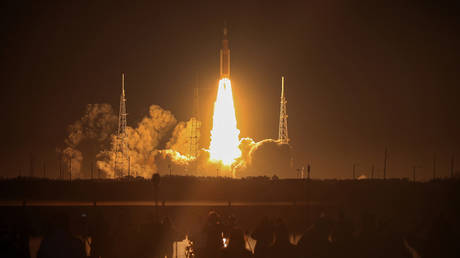
The Artemis II and III lunar missions were expected to take off in 2024 and 2025 respectively
NASA has delayed two of its flagship missions meant to take humans back to the Moon, citing technical issues. The US space agency’s Artemis II and III missions will now take place in 2025 and 2026 respectively, nearly one year later than planned, although the next stage of the program is still scheduled for 2028.
The agency made the announcement on Tuesday, saying it needed to adjust the launch dates to have an opportunity “to work through challenges associated with first-time developments, operations, and integration.”
Explaining the delay, Administrator Bill Nelson said “the safety of our astronauts is NASA’s top priority as we prepare for future Artemis missions.” NASA also revealed it had discovered a battery issue during the first Artemis flight test, as well as problems with a component responsible for air ventilation and temperature control.
The Artemis program, which started in 2017, is named after the Greek goddess of the Moon, the sister of the god Apollo. NASA used the latter name for its historic effort to put the first man on the Moon in 1969.
The Artemis mission uses the partially reusable Orion spacecraft – produced by the US-based Lockheed Martin and European-based Airbus – as well the US-made Space Launch System (SLS) rocket.
Artemis II, now scheduled for September 2025 at the earliest, will send four astronauts to orbit the Moon to test the spacecraft’s systems in the real environment of deep space. It is expected to be followed by Artemis III around September 2026, which will send the first humans to explore the region near the lunar south pole.
The Artemis IV mission, scheduled for 2028, is expected to be the second crewed Moon landing mission during which the spacecraft will try to dock with the Lunar Gateway, a space station to be launched in November 2025.
The future endeavors will build on the Artemis I mission, launched in late 2022. It involved the first uncrewed flight test of the SLS rocket and the Orion spacecraft and ended in success, returning to Earth.
The primary goal of the Artemis program is Moon exploration, although it also seeks to lay the groundwork for future missions to Mars, even if that prospect remains distant. As things stand, NASA plans to send a crewed flight to Mars by the late 2030s or early 2040s.




